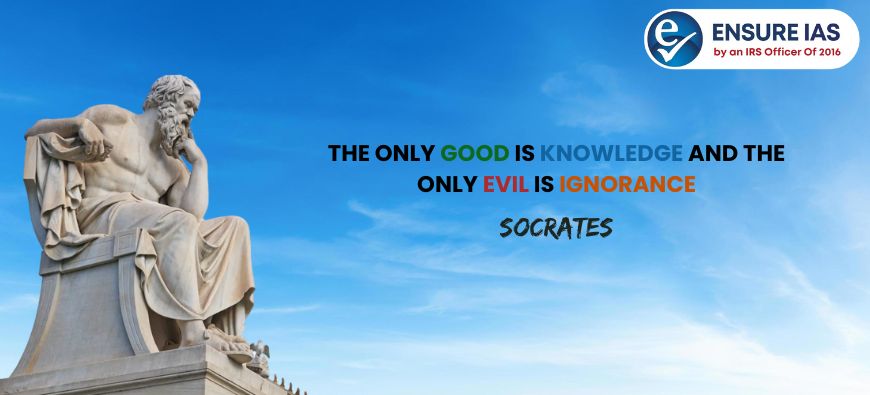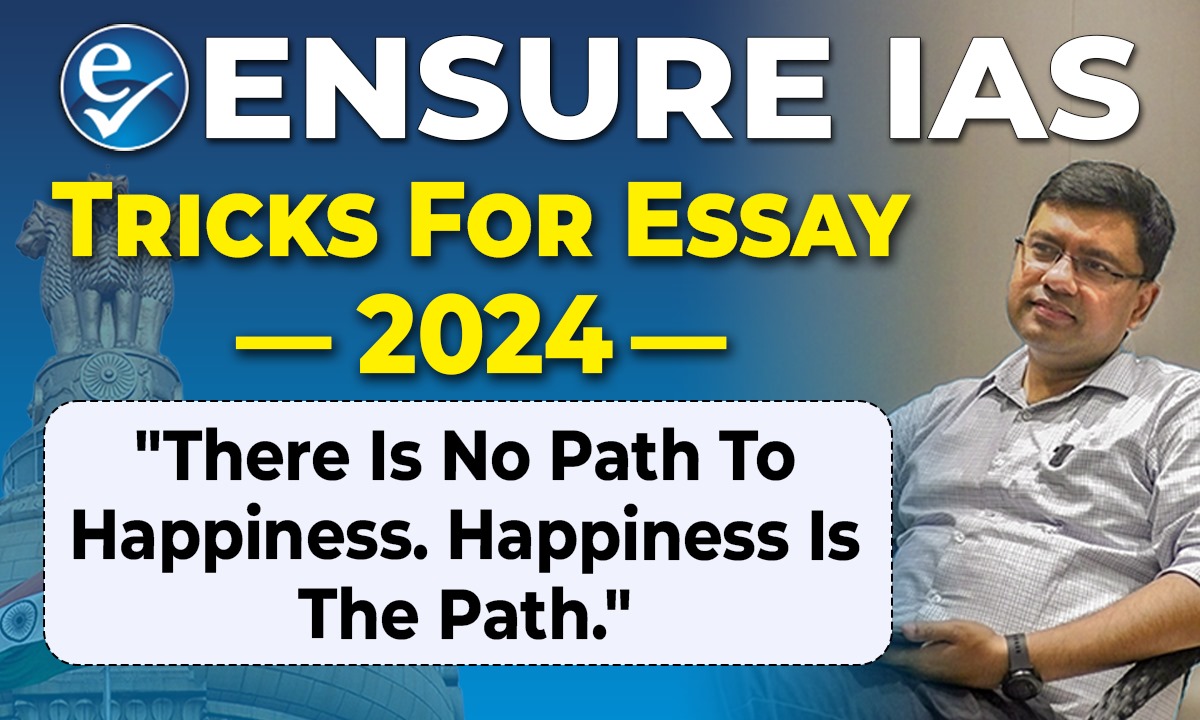- Courses
- GS Full Course 1 Year
- GS Full Course 2 Year
- GS Full Course 3 Year
- GS Full Course Till Selection
- Answer Alpha: Mains 2025 Mentorship
- MEP (Mains Enrichment Programme) Data, Facts
- Essay Target – 150+ Marks
- Online Program
- GS Recorded Course
- Polity
- Geography
- Economy
- Ancient, Medieval and Art & Culture AMAC
- Modern India, Post Independence & World History
- Environment
- Governance
- Science & Technology
- International Relations and Internal Security
- Disaster Management
- Ethics
- NCERT Current Affairs
- Indian Society and Social Issue
- NCERT- Science and Technology
- NCERT - Geography
- NCERT - Ancient History
- NCERT- World History
- NCERT Modern History
- CSAT
- 5 LAYERED ARJUNA Mentorship
- Public Administration Optional
- ABOUT US
- OUR TOPPERS
- TEST SERIES
- FREE STUDY MATERIAL
- VIDEOS
- CONTACT US
THE ONLY GOOD IS KNOWLEDGE AND THE ONLY EVIL IS IGNORANCE
THE ONLY GOOD IS KNOWLEDGE AND THE ONLY EVIL IS IGNORANCE

“Are you excited?” asked the mother of a jubilant boy, who was about to embark on his very first day of school. He was the only one amongst his friends who was going to school. This innocent boy was unaware of the reality; All he knows is that children wear the same uniform and experience the same fun, education, and learning in school.
On the very first day, however, he was forced to sit apart from the others. He wasn't even allowed to touch the tap of water, being told that his mere touch could pollute the water. Disheartened, the little boy narrated the whole story to his mother. The mother advised him to ignore such things, explaining that it is a convention of society and they needed to respect the norms set by the upper caste people, as they came from a deprived section of society.
But that day, the boy didn't believe in ignorance. Instead, he resolved to work hard continuously to acquire knowledge, aiming to combat such injustices in society. He understood that ignorance was not the answer, but rather knowledge. That boy grew up to be none other than the father of the Indian Constitution, Dr. Bhim Rao Ambedkar. He wielded knowledge as his weapon to fight against the evils present in society, firmly standing against evils rather than ignoring them.
In this essay, we will analyze why knowledge is inherently good and ignorance is evil. We'll explore the consequences of ignorance and examine whether knowledge always ensures positive outcomes.
Knowledge is important in personal as well as societal development. It helps individuals to decide and evaluate the aftereffects, the right and wrong. Empowering individuals, knowledge enables them to make informed decisions, solve problems, and engage critically with the world around them. It helps one to introspect the truth. As Socrates said, "An unexamined life is not worthy of living." It broadens perspective and fosters empathy and understanding. It helps to avoid failure and undesired outcomes, moral dissonance, and, at the same time, uplifts the vulnerable from evil situations.
In agriculture, knowledgeable farmers reap significant benefits. They know the best time to sow, the right amount of fertilizers to use, and the ideal time to harvest, resulting in successful production. Conversely, ignorance in farming practices often leads to disastrous outcomes like crop failure and poverty, sometimes even driving farmers to suicide.
Similarly, in society, individuals armed with knowledge have been pivotal in addressing social injustices. Take, for instance, the inspiring story of Nobel laureate Kailash Satyarthi, who rescued and educated thousands of children to combat widespread child labor. Similarly, in the 19th century, Raja Ram Mohan Roy's knowledge and courage helped him stand against the morally abhorrent practice of Sati, despite widespread acceptance fueled by fear of communal tensions.
The Bhopal gas tragedy stands as a stark reminder of the catastrophic consequences of ignorance and negligence. Thousands lost their lives and suffered organ damage due to the reckless actions of a few. On the other hand, individuals like Greta Thunberg demonstrate the power of knowledge in effecting positive change. Through her activism and informed advocacy, she has become a beacon of hope in the fight against environmental degradation.
While knowledge is undoubtedly valuable, it's essential to recognize that its impact depends on how it is wielded. As the saying goes, "Knowledge is a treasure, but practice is the key to unlocking it" (ज्ञान एक खजाना है, लेकिन अभ्यास इसे खोलने की कुंजी है). Unfortunately, we have witnessed instances where knowledge has been misused for evil purposes, such as the development and use of nuclear weapons or unethical genetic manipulation. Additionally, the manipulation of information for political gain or radicalization exemplifies how knowledge can be distorted to perpetuate harm instead of fostering progress.
If knowledge is not always good? Thought should also be given to the fact that, Is Ignorance always evil?
Ignorance, the lack of knowledge, can sometimes inadvertently lead to positive outcomes. In certain situations, being unaware of preexisting prejudices and stereotypes can enable individuals to avoid engaging in harmful behaviors. For instance, remaining ignorant of patriarchal biases helps individuals distance themselves from the evils of women's exploitation.
Moreover, ignorance can also lead to innovation. Consider the case of Mahendra Singh Dhoni, who, unaware of conventional batting styles, invented the "Helicopter shot," which eventually became a widely recognized cricketing technique. This innovation was discovered from Dhoni's ignorance of traditional methods, ultimately contributing to the sport's knowledge base and developing positive developments.
Understanding why people remain ignorant is important, considering the deep consequences and benefits associated with knowledge. Various factors have contributed to ignorance, including circumstances and situations. For example, among tribal communities and forest dwellers, lack of access to education and information often forces them to resort to practices like Jhum cultivation as a means of survival.
Similarly, new challenges can arise for which society lacks adequate knowledge. One notable example is the occurrence of black swan events such as the COVID-19 pandemic. Initially unaware of the virus and its transmission mechanisms, people were ignorant of essential preventive measures like hand washing, mask wearing, and social distancing, leading to widespread transmission and its dire consequences.
And sometimes, it's not a matter of choice but rather compulsion that leads us to remain ignorant, even when we're aware of the consequences. For instance, consider an ambulance driver who, fully cognizant of the potential risks, decides to break a traffic signal to save a human life.
To address the consequences of ignorance, it's essential to explore measures that individuals, societies, nations, and the global community can adopt to avoid ignorance.
At the individual level, fostering introspection, questioning, and cultivating feelings of tolerance and compassion are crucial steps. By becoming more introspective and questioning our own beliefs and actions, individuals can develop a heightened awareness of their surroundings and actively confront the evils of ignorance.
On a societal level, promoting value education and fostering social harmony are effective tools for combating ignorance and its associated evils. By instilling values of empathy, respect, and understanding in society, we can create an environment that discourages ignorance and encourages mutual respect and cooperation.
Nationally and globally, multilateral agreements and the sharing of best practices play a crucial role in addressing ignorance and its consequences. For instance, initiatives like vaccine diplomacy, such as the COVAX program, facilitate the equitable distribution of vaccines globally, helping to combat the spread of diseases like COVID-19 and mitigate its impact on vulnerable populations.
By embracing these measures at all levels, from individual introspection to global cooperation, we can collectively work towards overcoming the evils of ignorance and fostering a more enlightened and compassionate world.
In conclusion, our journey through the exploration of knowledge and ignorance has shown us the immense impact they have on individuals and society. Reflecting on the story of the excited boy starting school, we're reminded of how important it is to seek knowledge and avoid ignorance. Just like Dr. Bhim Rao Ambedkar, who fought against ignorance to create India's constitution, we're inspired to follow his example and strive for enlightenment and fairness.
Looking ahead, we need to encourage everyone to keep learning and asking questions. As Mahatma Gandhi wisely said, "Live as if you were to die tomorrow. Learn as if you were to live forever" (जी भर के जीयें। इस तरह से सीखिए जैसे कि आपको यहां हमेशा रहना है). By thinking about our beliefs and understanding different perspectives, we can fight ignorance and make the world a better place. We also need to focus on educating people and bringing communities together. For instance, Kailash Satyarthi's work to end child labor shows us the power of education and standing up for what's right. And when we work together globally, like with programs such as COVAX, we can tackle big challenges and make sure everyone has access to knowledge and resources.
As we move forward, let's remember the lessons we've learned and strive to make the world a better, more equal place for everyone.
Must Check: Best IAS Coaching In Delhi
Mathematics is the Music of Reason" (MAINS 2024)
The Price of Procrastination: Fulfilling Today’s Duties for a Better Tomorrow

